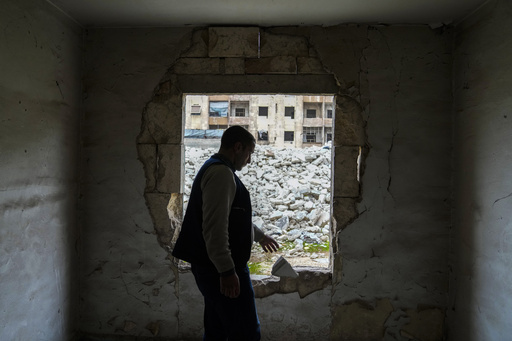
ALEPPO, Syria — Upon returning to Syria from Turkey, Ahmed al-Kassem embraced his sister tightly, emotions overwhelming them as they shed tears of joy. After a decade apart, this reunion came mere days after the fall of President Bashar Assad from power. However, the elation of reuniting quickly shifted to worry, as the state of his war-ravaged country became all too apparent. The family home in Aleppo was in ruins, while the other home he had brought his family to was devoid of essential services like electricity and clean water.
“I don’t know if I would have returned had I known this would be the reality,” expressed the 38-year-old al-Kassem. “Life was not perfect in Turkey, but what I’ve encountered here is truly a disaster.” He and his family are among over 7,600 Syrian refugees who have reportedly crossed back into Syria since December 9—following the notable change in governance. Thousands more have made the journey back from Lebanon. This article traces the journey of al-Kassem’s family, from their departure from Turkey to their initial days back in Aleppo, a city still bearing the scars of civil strife.
Leaving behind a life they had established over eleven years in Turkey, four of al-Kassem’s five children had been born there. The children only connected with their relatives via video calls. Al-Kassem viewed their return as an opportunity to reconnect with family, resume their lives, and introduce their kids—three girls and two boys aged 7 to 14—to their roots. Yet, this return comes with a significant leap into an uncertain Syria that is still taking shape. Their chances of being allowed back into Turkey seem slim.
At the Oncupinar border crossing in Turkey, the family endured hours of waiting before surrendering their “temporary protection” papers, which marked their status as refugees. After crossing over to the Syrian side, known as Bab al-Salameh, they transferred their belongings, including a carpet and a washing machine, from one truck to another.
The journey in a van took an hour through the northwest region until they finally arrived at Aleppo’s Masaken Hanano neighborhood. It was dark, with no electricity illuminating the area. They witnessed buildings—once homes—lying in ruins from past conflicts. Using the flashlight from his mobile phone, al-Kassem guided his family through a dim alley to his sister’s house, which, thankfully, remained structurally sound. It was there that the emotional reunion unfolded, seeing loved ones and allowing the children to meet their cousins for the first time.
Yet, their harsh new reality soon set in. When journalists encountered al-Kassem three days after their return, he had sent his children to stay with another relative due to the lack of basic services at his sister’s home. While that relative had at least a few hours of electricity daily, it was still a far cry from their previous life. Al-Kassem voiced his uncertainty about whether returning so soon was wise.
“Seeing my country liberated motivated me to return and show my children their homeland,” al-Kassem reflected. “However, I underestimated how shocking the current conditions here would be for them.” In Turkey, the family enjoyed running water, electricity, and internet access—essentials that felt nearly nonexistent in their new surroundings. “We’ve been here for days without proper water supply. I am at a loss about where to go next with my children,” he stated.
His 14-year-old daughter, Rawiya, expressed joy in reuniting with relatives but felt anxious about transitioning to an Aleppo school after attending Turkish institutions for so long. Fluent in conversational Arabic, she lamented, “Learning to read and write Arabic from scratch will be challenging.” Despite her concerns, she found happiness in returning to Syria. Rawiya had been just four years old when her family fled Aleppo in 2013 amidst escalating violence between rebels and government forces.
The al-Kassem family had settled in Kahramanmaras, Turkey, where al-Kassem worked in construction as he did in Syria. His children, while fluent in Turkish, had little experience with Arabic. Aleppo, once a thriving economic center and the largest city in Syria, has been significantly harmed by prolonged fighting, although the government regained control of the city entirely in 2016. The eastern section remains devastated, with skeletal buildings testifying to lost lives and dreams.
As the locals gathered under the historic castle of Aleppo, many expressed their joy over Assad’s recent downfall. A Syrian revolutionary flag now graced the castle, drawing visitors who celebrated the momentous occasion. “Today, we share in this happiness together,” said Huzam Jbara, a mother from Idlib province enjoying her first visit to Aleppo in a decade. “We are delighted; we’ve finally rid ourselves of a tyrant who oppressed us.”
Despite the festive atmosphere, symptoms of poverty loomed large, with long lines at bakeries indicating the severity of the economic crisis plaguing Syria. As al-Kassem revisited his former home in Masaken Hanano, he found it shattered, with belongings either destroyed or looted. Reflecting on his struggles in Turkey, where the family faced challenges from the COVID pandemic and a severe earthquake, he acknowledged that returning to Syria presented its own set of difficulties.
“I must learn to adapt to these conditions,” al-Kassem concluded. “Why? Because this is still my homeland, my home, and our people are here.”
